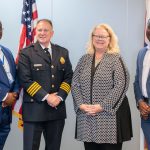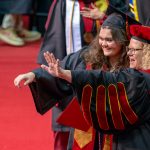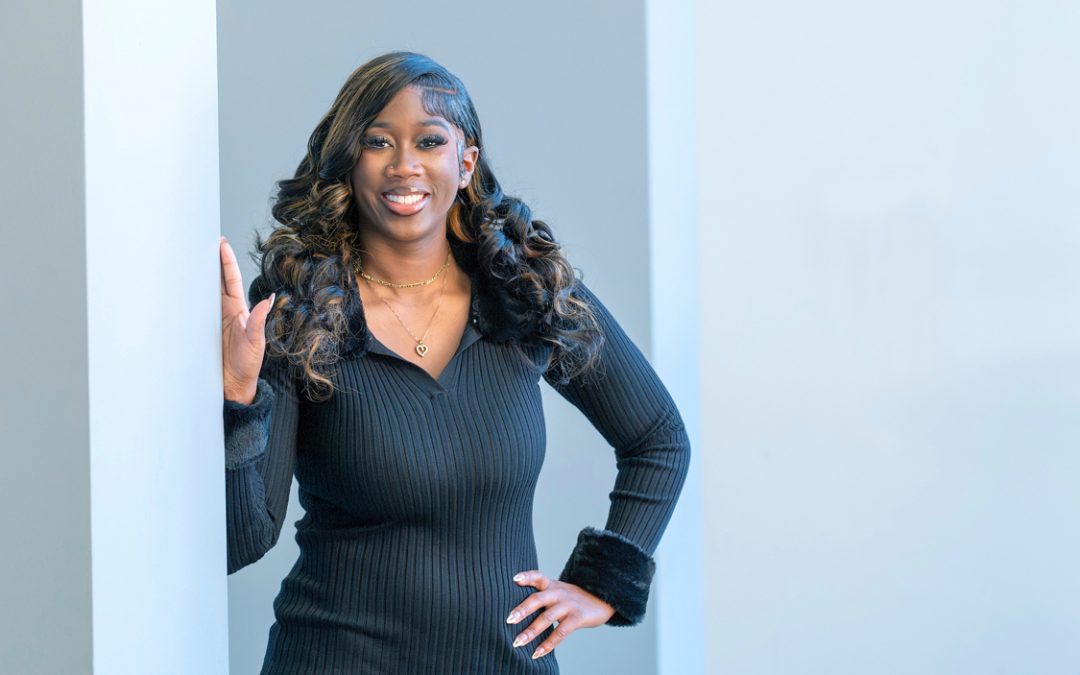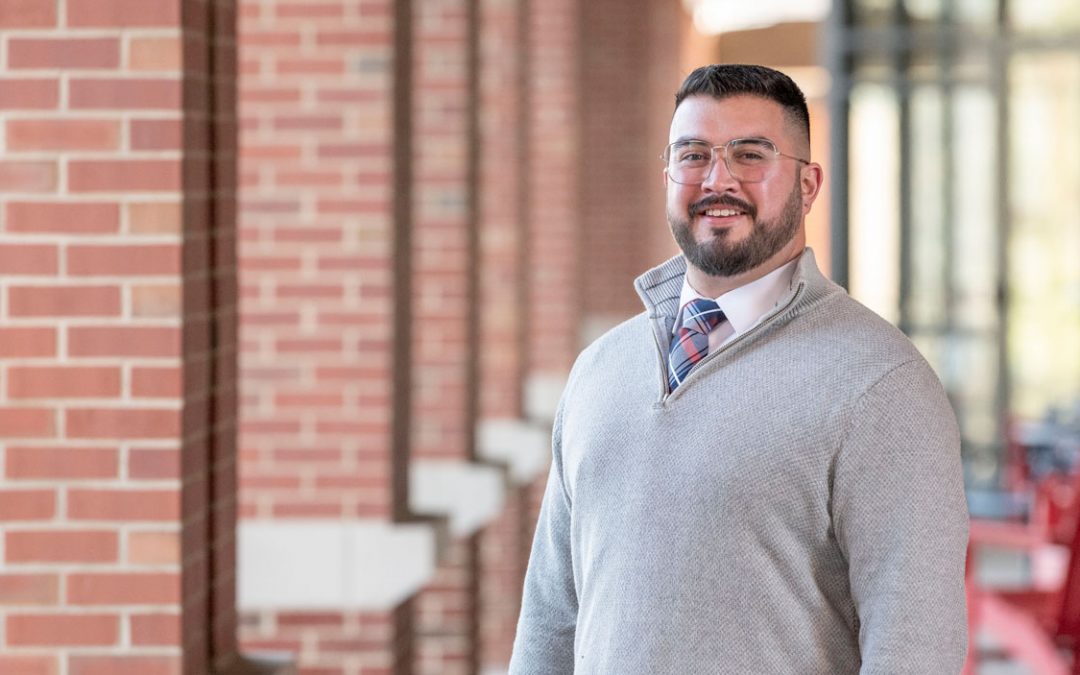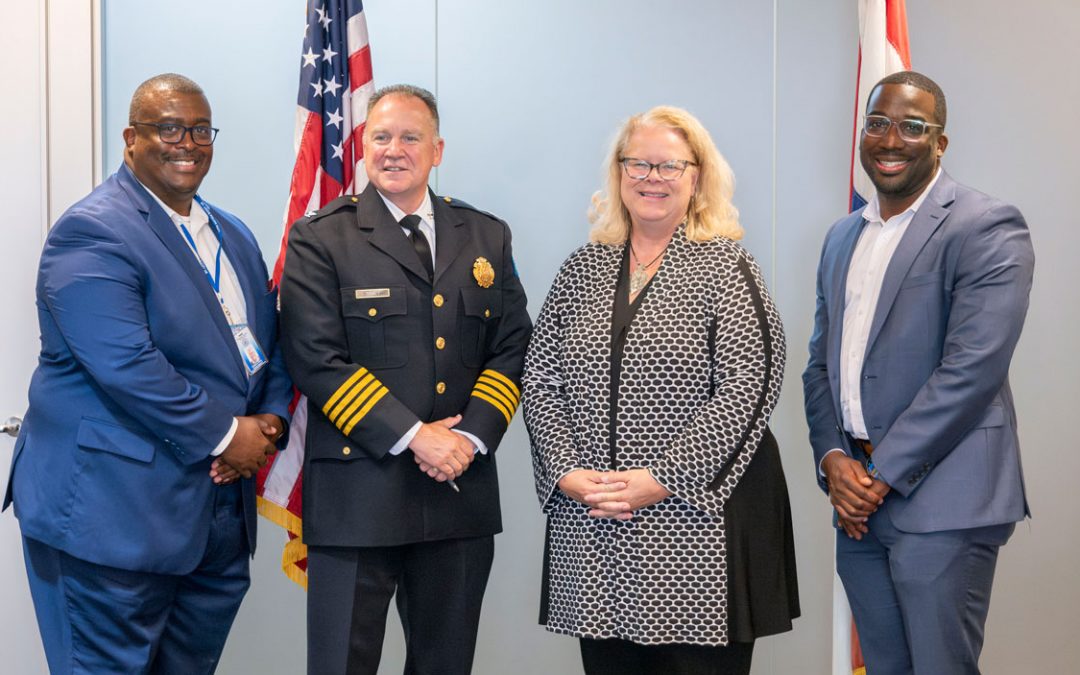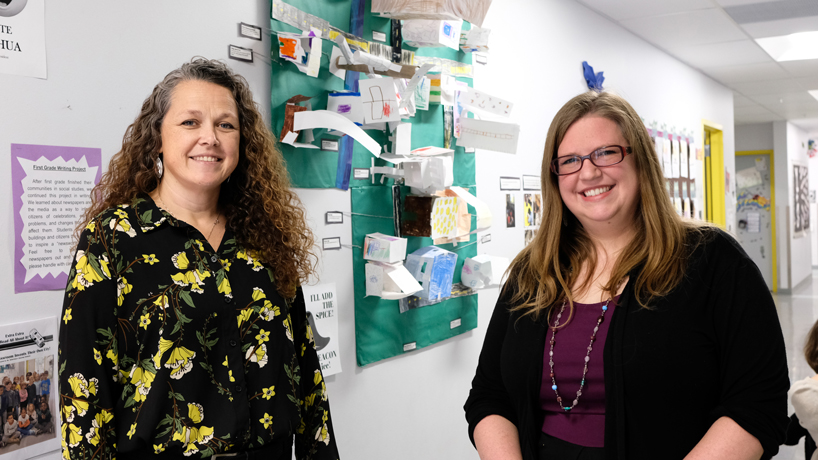
Lafayette Preparatory Academy Executive Director Susan Marino and Head of School Sarah Ranney were jointly named as Leader of the Year by the Missouri Charter Public School Association. The two educators have helped the school grow over the past eight years, and they are now researching elements of charter school success as part of the UMSL EdD program. (Photo by August Jennewein)
Above all else, Lafayette Preparatory Academy is a community.
So, it felt a little strange for the leaders of the south St. Louis charter school, Susan Marino and Sarah Ranney, to be singled out as the winners of the Missouri Charter Public School Association Award for Excellence in Education for School Leader of the Year.
“It’s very humbling to be recognized as the leader honestly,” said Marino, executive director of LPA. “Nobody did this in isolation. What we’ve accomplished in the last eight years is exceptional, and there’s just no way to have gotten here without our full community.”
While bonds between parents, students and staff are focal points at LPA, Marino and Ranney, head of school, have also been instrumental in the its success.
As self-described “lifelong learners,” they decided to take the plunge together into the EdD program at the University of Missouri–St. Louis in 2018 to further their professional development and support their goals to grow LPA.
Both Marino and Ranney already hold multiple degrees, so it wasn’t a difficult decision to go back to school again, especially at UMSL.
“This is my sixth degree,” Ranney said jokingly.
It was her experience in UMSL’s MEd program that convinced Marino the doctoral program was the right move.
“I think for us, we’re constantly ready to learn more and be better at what we do,” Marino said. “Hearing Sarah talk about her master’s program at UMSL, she was having a great experience with the professors that she had there. I did not have the same kind of experience at my previous university.”
The pair’s impulse to continuously progress has been a boon to the school over the past eight years.
LPA began operating as a charter public school in 2013 – though the process began in 2012 – with about 75 students in kindergarten through second grade. The school now serves nearly 400 pre-kindergarten through eighth grade students.
Since LPA’s founding, UMSL has been its charter school sponsor, providing support and oversight. It is one of seven schools the university sponsors throughout the city.
As executive director, Marino spearheaded the opening of LPA. Ranney began as the school’s director of curriculum in 2014, moving into her current role two years later. Marino said it started as a grassroots effort by local parents and community leaders in response to friends and family members moving out of the city once their children became school aged.
“The whole impetus for it was to create a way to stabilize the city and create a school that would encourage people to stay in the city,” Marino said. “We built it as a school for all kids, not just those who have the means to leave the city if they were to so choose.”
The school’s ethos is twofold: to create an engaged, diverse community and a culture of academic excellence. Ultimately, that’s what they credit for their MCPSA award.
“Our kids are invested in being LPA students, and because our kids are invested, they go home and they talk to their parents about it,” Ranney said. “Then their parents have really great relationships with the staff.”
In academics, Marino noted that during the previous school year LPA was recognized for making the most growth for students in English and language arts and the second most growth for math in the region.
Ranney attributed this to making students feel welcome in the classroom while still challenging them.
“The first thing is building relationships with our students because the kids need to feel safe and loved and valued for who they are,” Ranney said. “Then holding high expectations for each individual kid. If kids are not presented with challenges and given the opportunity to make mistakes, they are less likely to reach their full potential. I think it’s about those three things at the same time – building relationships with kids, holding them to high expectations and then setting them up to be successful.”
While Marino and Ranney are reticent to take credit personally, it was still nice to be recognized by the MCPSA.
“I think it just speaks to the nature of our school, the fact that we won it together,” Marino said. “It feels like a great affirmation that our school has been this collective and community effort.”
In addition to preparing the school for instruction during the COVID-19 pandemic, the pair is working on finishing their joint dissertation.
They had anticipated finishing it and the EdD program by December but have extended their timeline to next May due to the pandemic. Their dissertation focuses on school- and community-level characteristics that lead to charter school success.
“One of the things that we both found really interesting is, why has our school made it?” Ranney said.
She clarified that LPA hasn’t reached their ideal vision yet, but she and Marino hope researching the variables that go into charter school success will make the school even better. Marino also hopes that the research will eventually serve as a resource for other schools in the region.
“A lot of studies about charter schools address things like how schools help kids learn to read better, so there are studies about that,” Marino said. “But there isn’t research about what gets a school from zero to healthy.”
Their study will look at every Missouri charter school that has ever been authorized from opening to Year 5. Based on a set of criteria, each school will be categorized as successful or as not having met the criteria for successful. The criteria include a variety of benchmarks such as academic scores, enrollment, finances, disciplinary actions (suspensions and expulsions) and staff diversity.
Marino said they will go back over the data and figure out what made schools successful based on what they prioritized and did well.
“We’ll follow that up with interviews with a select number of people from both the successful schools and the schools that don’t meet the criteria, as well as their sponsors, to get more details,” Marino added.
Whether they’re sorting through years of data or accepting professional recognition, Marino and Ranney are acutely aware of what it’s all for: the kids.
“What we’re keen on doing is enriching students’ lives together and asking, ‘How do we build a program that ensures that students are their best selves while they are with us?’” Ranney said. “It is about us enriching our students’ lives so that they can go forth and enrich our community.”





